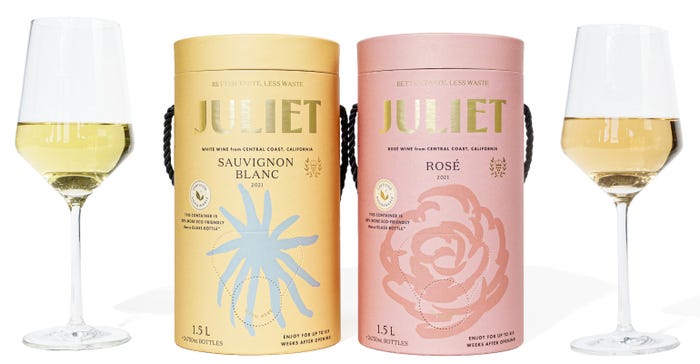Luxury Bag-in-Box Wine Prioritizes Sustainability
Juliet’s cylindrical BIB pack combines sustainability with elegant looks, putting a new spin on boxed wine.

Juliet, a luxury-wine company committed to eco-friendly production and packaging, has developed a cylindrical bag-in-box (BIB) package that addresses sustainability several ways: The package has a much smaller carbon footprint than glass bottles, is recyclable, and is designed to accommodate refill pouches.
The first Juliet wines, a Sauvignon Blanc and a Grenache Rosé, launched in July 2022; a Pinot Noir will follow. A Certified California Sustainable Winery in California’s “Happy Canyon of Santa Barbara” American Viticultural Area (AVA) produces the wines, which have a retail price of $45.99.
The brand owner touts Juliet as the first-to-market cylindrical, 1.5-L BIB package for wine (the equivalent of two standard bottles). The proprietary carton, dubbed Eco-Magnum, was designed in-house at Juliet.
The carton’s rounded shape and chic packaging graphics reflect Juliet’s target demographic, women who enjoy fine wine and also value sustainability.
Across brands, BIB packaging offers substantial sustainability benefits vs. glass bottles, based on materials weight and greenhouse gas emissions. That includes emissions related to transportation.
An independent analysis of wine packaging shows that BIB packaging has an 84% smaller footprint than glass bottles. The analysis incorporates data from a California Sustainable Winegrowing Alliance report.
Juliet’s package design also takes end-of-life into account. Consumers can place their empty, rinsed pouches (including the spout) in their curbside recycling bin, if No. 7 plastics are accepted. Or, they can request a free return shipping label from Juliet to send back the empty pouches for recycling. The carton incorporates recycled material and can be recycled with other paper-based packaging.
Currently, Juliet is developing what it believes to be the first at-home wine refill system in the United States. When the system launches, consumers will be able to reuse the Juliet cartons by ordering replacement pouches of wine at a discount.
The BIB package provides shelf life of up to six weeks after opening. It’s convenient, too. No corkscrew is required, and the pack’s handle makes it easy to carry. And because it��’s glass-free, the package is well suited to picnics and other outdoor activities.
Juliet is a member of 1% for the Planet, an alliance of businesses that funds grassroots environmental groups worldwide. The company has pledged a minimum of 1% of its sales to recycling education and reforestation projects.
In this exclusive Q&A, Allison Luvera and Lauren De Niro Pipher, Juliet’s founders and co-CEOs, answer questions about their wine packaging and the company’s focus on sustainability.
What was your impetus for starting Juliet? Was creating a more sustainable, innovative wine package the key driver?
Luvera: After discovering that glass bottles and their transport are the two largest contributors to wine’s carbon emissions, we were inspired to create a boxed wine so pioneering and luxurious that it would transcend the category entirely. We felt strongly that innovative and beautiful packaging would be key to destigmatizing the boxed-wine format, which has historically been associated with inexpensive, lower-quality products.
“... We were inspired to create a boxed wine so pioneering and luxurious that it would transcend the category entirely. We felt strongly that innovative and beautiful packaging would be key to destigmatizing the boxed-wine format ...” — Allison Luvera
How did you come up with the idea for a round carton, and why opt for round vs. the standard rectangular carton?
Luvera: We designed our proprietary Eco-Magnum to serve as a bridge between boxed and bottled wines. Juliet’s innovative form factor was developed to appeal to two segments — boxed wine lovers who want a more premium offering and discerning bottled wine drinkers who desire convenience and sustainability.
We loved that aesthetically the cylindrical shape looks beautiful on a back bar or dinner table. And from a functional perspective, it fits neatly onto a refrigerator shelf.
A round carton is less cube-efficient in shipping than a rectangular carton, which negatively affects carbon footprint. From a sustainability point of view, how did you reconcile the decision to use a round carton?
De Niro Pipher: All bag-in-box packaging utilizes significantly less resources than glass bottles in terms of total material weight, total energy required, and post-consumer solid waste. We are in the process of conducting a carbon audit on our supply chain, after which we will have more precise data to share on carbon emissions.
Who are your packaging suppliers?
Luvera: The Juliet Eco-Magnum was designed in-house and executed in partnership with manufacturing engineers in the US and abroad. We don’t publicly disclose our supplier partners.
Please tell us about your use of recycled and recyclable materials in this package.
De Niro Pipher: We selected our supplier partner for the wine pouches based on its outstanding commitment to innovative design for the circular future. It is a member of the Sustainable Packaging Coalition, and all of its products and processes are built to realize a significant reduction in the use of fossil materials and related CO2 footprint while providing a positive consumer experience.
The plastic films … have simple, monomaterial construction to aid in recyclability of finished packaging. The paperboard Eco-Magnum, interior pouch, and dispensing spout are all recyclable.
You give consumers the option of returning their empty Juliet pouches to you for recycling, for free. Why?
De Niro Pipher: Some local recycling programs do not offer solutions for all plastics. Juliet’s take-back scheme offers consumers the opportunity to send us their empty pouches to ensure they are properly recycled.
How will Juliet recycle the empty pouches that consumers send back to them?
De Niro Pipher: Juliet is working with TerraCycle to ensure the wine pouches are successfully recycled.
Please tell us more about the at-home wine refill system that Juliet is developing.
De Niro Pipher: Developing a refill system is one step that’s part of a broader goal of moving towards carbon neutrality. With the pouch and the Eco-Magnum being two separate parts, we have the opportunity to create a durable version of boxed wine with a removable lid, allowing consumers to re-order the inner wine pouches alone, thereby reducing materials used and transported, and increasing the life cycle of the paper outer.
“Developing a refill system is one step that’s part of a broader goal of moving towards carbon neutrality.” — Lauren De Niro Pipher
Do you package Juliet wines on an automatic packaging line?
Luvera: We use a semi-automated packaging line that first fills the pouch with wine and then seals it, after which it is placed into the Eco-Magnum.
What is the shelf life of the wines prior to opening the package?
Luvera: The shelf life of boxed wines prior to opening is approximately 12 months.
Your wines contain zero artificial additives and minimal ingredients, which are transparently stated on the label. Why is this important to your brand?
Luvera: Transparency is an important tenet of both sustainability and quality, which are core values of our brand. Consumers increasingly want to know more about the brands they purchase, including where they come from, how they are made, and what they are made with.
The wine industry traditionally doesn’t disclose ingredients, which has fostered confusion about what additives are allowed. It was important to us that we educate consumers on our process — we source high-quality grapes from acclaimed AVA vineyards and only use additives that are naturally occurring in grapes or wine, which allows the excellence of the fruit to shine through in our wine.
Do you plan to introduce any additional wines, in addition to Sauvignon Blanc, Rosé and Pinot Noir, in this packaging?
De Niro Pipher: Yes! Juliet is working on several exciting new offerings that will launch in 2023.
Is your target demographic specifically women?
Luvera: Juliet was designed with women in mind, especially working mothers and young professionals who are discerning wine drinkers and who also prioritize sustainability. They want — and deserve — a wine that doesn’t compromise on quality, convenience, or sustainability.
It was important to us that Juliet’s packaging design was beautiful enough to fit seamlessly into their world, whether as a non-guilty pleasure at the end of a long day or as a beautiful hostess gift for a pool party or dinner with friends.
How are your products doing in the market so far?
Luvera: The reception from customers and trade has been overwhelmingly positive. Year-one demand is on track to exceed our projections. We don’t publicly disclose sales or depletions data.
About the Author(s)
You May Also Like




